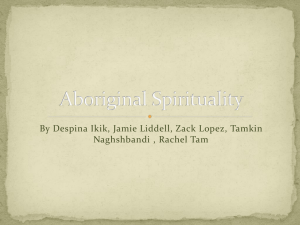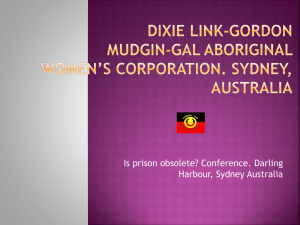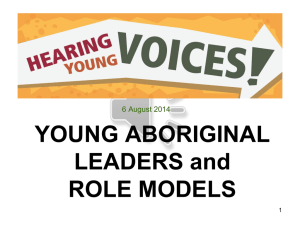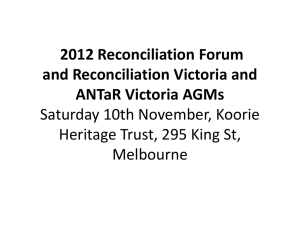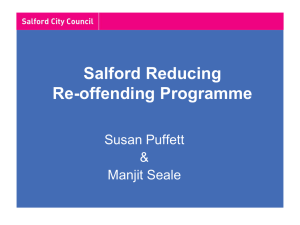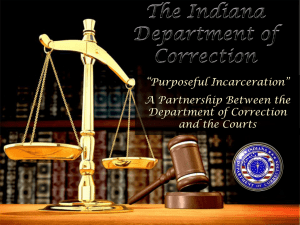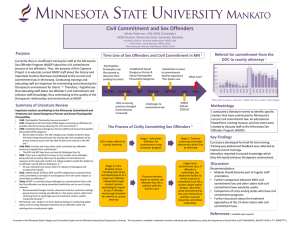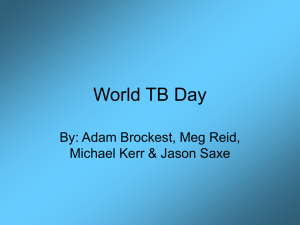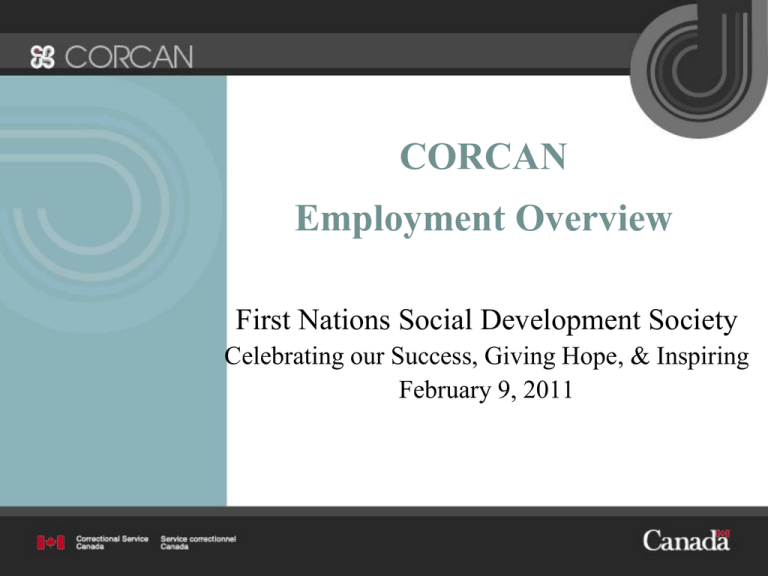
CORCAN
Employment Overview
First Nations Social Development Society
Celebrating our Success, Giving Hope, & Inspiring
February 9, 2011
Mission
The Correctional Service of Canada (CSC), as part
of the criminal justice system and respecting the
rule of law, contributes to public safety by actively
encouraging and assisting offenders to become
law-abiding citizens, while exercising reasonable,
safe, secure and humane control.
Corrections and Conditional
Release Act (CCRA)
• Section 3 of the CCRA indicates the purpose of the federal
correctional system is to contribute to the maintenance of a
just, peaceful and safe society by:
a) carrying out sentences imposed by the courts through the
safe and humane custody and supervision of offenders;
and
b) assisting the rehabilitation of offenders and their
reintegration into the community as law-abiding citizens
through the provision of programs in penitentiaries and
in the community.
CORCAN
• CORCAN is a program of the
Correctional Service of Canada.
• Our mandate is to provide
employment and employability
skills training to offenders.
CORCAN
Governing Principles
• CORCAN governing principles indicate we are:
To ensure inmates who participate in CORCAN
activities are fully, regularly, and suitably
employed in a work environment that strives to
achieve private sector standards of productivity
and quality.
To provide programs and services that facilitate
inmates’ re-entry into the work force.
PACIFIC REGION
• 10 federal institutions (including one facility for women
offenders)
• 1 Community Correctional Centre
• 5 parole areas in British Columbia including the Yukon
Territory.
• Approx. 3,000 offenders under our jurisdiction (1,800
are incarcerated and 1,200 are under community
supervision.)
• The Pacific Region employs 2,600 staff.
PACIFIC REGION
• The Region is responsible for the incarceration and
supervision of all offenders serving sentences of more
than two years in British Columbia and the Yukon
Territory. It also supervises provincial and territorial
offenders serving less than two years who are released
by the Parole Board of Canada.
• Nine federal institutions are located in the Lower
Mainland and one is located on Vancouver Island. The
five parole areas are located across the province
including the Yukon Territory.
PROGRAMS
• Intake to Warrant Expiry
–
–
–
–
–
–
Offender Intake Assessment
Placement
Interventions
Specialized Assessments
Case Preparation
Decision Making
(Wardens and Parole Board of Canada’s Authority)
– Placement
– Release and Monitoring
Integrated Correctional
Program Model (ICPM)
• The ICPM is a new and improved approach to
correctional programming that extends from the
intake stage of sentence to the community.
• This new program model includes three
correctional programs:
• a Multi-Target Program,
• a Sex Offender Program and
• an Aboriginal-Specific Multi-Target Program.
ICPM
Andrews – RNR
(Risk, Need, Responsivity)
Risk – Reserve the highest intervention for
those at the highest risk to re-offend
Need - Focus on Central Dynamic Risk
Factors:
•
•
•
•
•
•
•
•
Antisocial behaviour
Antisocial personality
Antisocial cognition
Antisocial associates
Family/Marital
School/work
Leisure/recreation
Substance abuse
Can criminals change?
• Do you think criminals can change the way
they act?
• Have you ever changed certain behaviours
in your life?
• Do you think it is different or harder for a
criminal to change bad behaviour in his or
her life?
Why do criminals change?
•
•
•
•
•
•
•
•
•
Fear of punishment?
Being separated from family and friends?
Learned their lesson?
Public pressure?
OR
Learned new skills?
Found enjoyment in non-criminal activities?
Got a job?
Went to school?
Participated in correctional programs?
Is prison alone changing behaviours?
• The act of incarceration alone does not cure bad behaviour.
Programs in prison can change behaviour.
• Did you know that offenders who participate in a program
while serving time in prison are less likely to re-offend than
those offenders who don’t participate in a program?
• Also, offenders that participate in community programs are
less likely to be readmitted to prison than those offenders
that don’t participate.
What changes criminal
behaviour?
• Only offenders can change their
behaviour. They have to want to change
to be successful.
• Because change is sometimes hard, CSC
helps offenders by offering them
Correctional Programs aimed at
changing bad behaviours that lead to
crime.
What is a Correctional
Program?
• A Correctional Program is a series of classes, either
in a group or individual setting, which address the
behaviours and reasons that lead a person to commit
a crime.
• A Correctional Program is an intervention in the
offender’s lifestyle, to change old ‘bad’ habits into
new ‘healthier’ ones.
CSC’s programs are a
recognized success worldwide!
• CSC reputation is positive all over the world. The service is a leader in
state-of-the-art correctional programs.
• CSC’s programs have been evaluated by experts and academics as well
as by CSC’s own Performance Evaluation sector. CSC programs
generate impressive results! They rank more successful than other
general rehabilitation programs.
• In the field of corrections, lessening the amount of offenders who
continue to commit crimes is very important. This is called ‘reducing
recidivism’. Studies show that programs generally reduce recidivism
between 10% and 30%. However, CSC’s programs have been shown
to reduce recidivism by an average of 45%!
Program Areas
• Correctional Programs are divided into
many program areas:
• Targeted criminogenic factor
programming
• Education
• Employment and Vocational Skills
Training
• Social Skills
• Leisure Skills Training
• Community Integration Skills
Results of CSC Programs
• As mentioned, CSC’s Correctional Programs have
been shown to reduce crime by an average of
45%.
• Evidence shows that CSC programming aimed at
changing criminogenic factors is a relevant and
effective means of reducing recidivism.
(Criminogenic factors are specific factors in offenders lives that
lead to crime.)
Results of CSC Programs
• CSC evaluations have shown that,
on average, every dollar spent in a
Correctional Program returns four
dollars in saved incarceration costs.
$1 investment = $4 savings
Future Direction – Transformation
• Correctional Programs are part of
CSC’s Transformation Agenda.
• The Programs Division is developing
four (4) Responsivity Portals to serve
as a useful resource for staff who
work directly with offenders.
Industrial Shops
Pacific Region shops include:
Furniture manufacturing
Textiles
Construction
Military vehicle overhaul
Services
Employed Aboriginal
Offenders in the Institutions
•
Current number of Aboriginal Offenders employed in the
institutions:
– Men
• 448 - 2010-2011 - Current to Date
• 456 - 2008-2009
• 444 - 2007-2008
• 459 - 2006-2007
– Women
•
18 – 2010-2011 - Current to Date
•
23 - 2008-2009
•
33 - 2007-2008
•
30 - 2006-2007
•
23 - 2005-2006
Aboriginal Offenders
Employed vs Unemployed
EMPLOYED
81 – 43%
"Other"
18%
Students
2%
Retired
2%
JOB SEEKERS
69 – 36%
OTHER
Emp - FT
34%
Job
Seeker
35%
41 – 21%
Disability
5%
Program
9%
Empl - PT
7%
CORCAN
• To address our priorities we have
established the following programs:
-
Intake Vocational Assessment
Work Assignments CORCAN and Services
National Employability Skills Program
Vocational Training and Construction at Pacific
Region Sites.
- Trade Specific Skills
- 3RD Party Certification
Addressing Priorities
CSC parliamentary established priorities include:
Interventions for First Nations, Métis, and Inuit
offenders.
We have established the following programs:
Vocational Training and Construction at Regional
Healing Lodge Kwikwexwelhp
Street Sweeper Brush program at the Regional
Treatment Centre.
Aboriginal Offenders in
Vocational Training
• Third party certified vocational training includes:
Building Service Worker
CORE Construction
Construction Safety Training Systems (CSTS)
Culinary Arts
Fall Protection
First Aid – Multiple Levels
Food Safe
Forklift Operator
WHMIS
Residential Construction Framing
Vocational Training Results
• CORCAN issued 166 vocational 3rd party
certificates to Aboriginal Offenders.
139 to Men
27 to Women
Offenders Registered in
Apprenticeship Programs
•
Apprenticeship numbers (Trade and Number)
•
– Cook – 120
– Industrial Mechanic (Millwright) - 2
– Heavy Duty Equipment Tech – 5
– Cabinet Maker – 20
– Industrial Warehouse Person – 1
– Welder – 8
– Plumber-1
– Automotive refinishing technician- 4
– Automotive service technician-1
– Electrician- 1
– Residential Construction Faming Tech – 42
TOTAL 205
•
Total number of Work-Based Training Hours reported to
ITA (since Dec 2008): 131,367
Kwikwexwelhp
Construction Program
In addition to vocational training we are
currently offering construction training as
we renovate the aging facilities with set
aside funding.
Community Employment Centres
We have seven different Community
Employment Centres in the Pacific Region.
JHS – Victoria
JHS – Nanaimo
BC Borstal
Westcoast Genesis – New Westminster
LINC – Fraser Valley
Okanagan Halfway House – Kelowna
Activators – Prince George
A Community Partnership
CORCAN Pacific Region entered into a
partnership with a community businesses or
organizations.
Street Sweeper Program - RTC
Habitat for Humanity
Aboriginal Partnership
• From time to time we hold various contracts for
Aboriginal specific support/training programs from
set aside funding.
• The main purpose of these contracts is to address the
unique employment and education needs of
aboriginal people.
• We have also partnered with Sto:lo Nation
• One of which was an In Reach Program partnership
with Métis Skills and Employment Centre – member
of Aboriginal Human Resources Development
Agreement (AHRDA)
Aboriginal Partnership
• We are actively seeking partnerships with:
– Member of Aboriginal Human Resources
Development Agreement (AHRDA)
– First Nations communities to work with CSC in
transferring custody of offenders to the community
through Section 84.
– Existing not for profit organizations.
– Other government departments
Aboriginal Partnership
Section 84 is part of the Corrections and Conditional Release
Act and reads as follows:
•
•
•
•
•
•
84. Where an inmate who is applying for parole has expressed an
interest in being released to an aboriginal community, the Service
shall, if the inmate consents, give the aboriginal community
(a) adequate notice of the inmate's parole application; and
(b) an opportunity to propose a plan for the inmate's release to,
and integration into, the aboriginal community.
84.1 Where an offender who is required to be supervised by a
long-term supervision order has expressed an interest in being
supervised in an aboriginal community, the Service shall, if the
offender consents, give the aboriginal community
(a) adequate notice of the order; and
(b) an opportunity to propose a plan for the offender's release on
supervision, and integration, into the aboriginal community.
Aboriginal Partnership
For additional information on Section 84 of the Corrections and
Conditional Release Act or other Aboriginal specific
partnerships:
Aboriginal Community Development Officers:
Fraser Valley - Jeannie Andreassen – 604-870-2748
Greater Vancouver Area – Laura Baird – 604-202-6332
Prince George/Northern BC – Chris Hans - 250-851-4802
Vancouver Island – Carolyn Sampson – 250-363-0528
Aboriginal Community Liaison Officers:
Fraser Valley – Mel Huntinghawk – 604-820-5796
Vancouver/New West Parole – Veronica Sevigny – 604-666-8004
RESEARCH
• Addictions Research Centre in Montague
• Research Unit National Headquarters
(Ottawa)
• Collaborative Research – Leading
Universities
•
•
•
•
•
•
Queens
Carleton
UBC
SFU
Saskatchewan
Alberta
• Ethics Committee (National and Regional)
CAREERS
• CSC offers a wide variety of jobs and professions.
• Positions are available in correctional institutions,
parole offices and halfway houses, as well as in
office environments at regional and national
headquarters.
• Find out more about the many career opportunities
CSC offers by reading our career profiles.
CAREERS
•
•
•
•
•
•
•
•
•
•
•
•
Aboriginal Community Development Officer
Aboriginal Correctional Program Officer
Aboriginal Liaison Officer
Correctional Officer
Correctional Program Officer
Nurses
Parole Officer
Pharmacist
Primary Worker – Kimisinaw
Psychologist (Registered) and Assistant Psychologist (Non-registered)
Social Program Officer
Social Worker
http://www.csc-scc.gc.ca/text/emplo-eng.shtml
SUMMARY
• CORCAN is contributing to public safety
by providing employment and
employability skills training to offenders in
order to strengthen the potential for
successful reintegration.
Questions - Contact
Sandra Thiessen
Regional Director
CORCAN – Pacific Region
(604) 870-2549
Alejandra Holeczek
Manager, Employment Employability Programs
CORCAN – Pacific Region
(604) 870-2537


